Text
After today, you won’t be able to say that you’ve never heard my voice before.
You also won’t be able to look at The Batman the same… not ever again.
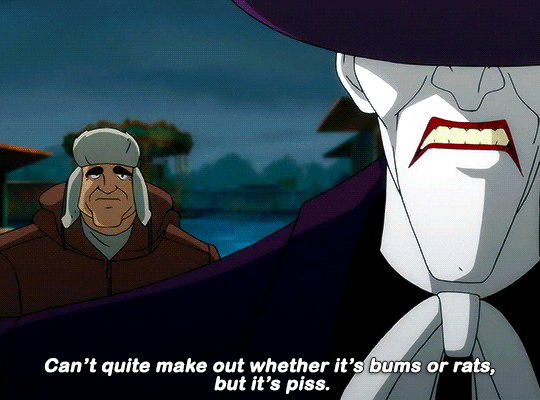
Is the rat the bat? I know Joker thinks so.
Listen below.
#the batman theory#Edward Nashton#The Riddler#Bruce Wayne#The Joker#the Batman review#villainism#villainism a villains transformation#Nina Robinson#dc comics#dcu comics#SoundCloud#the rat is the bat#the bat is the rat
4 notes
·
View notes
Text
Little Ashes: The Surreal Insanity of Dalí
Dalí the Dandy Villain - in the film little fascist, I mean "Little Ashes."

Warnings: nudity, fascism, homophobia, cursing, anarchy, politics, war, death (minor) +++Queer Fanfic at the end
Affiliations: revolutionary, change, taboo, disruption,
oppression, repression
art, poetry, politics
Odd, strange, bizarre, different, atypical, queer, avant garde
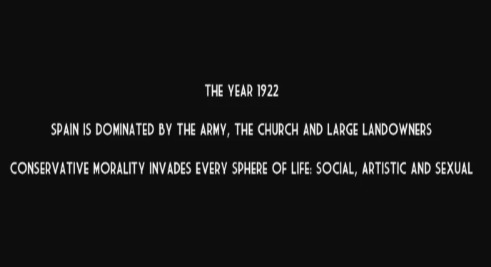
("Little Ashes:" Setting: Spain 1922)
Dali's World:
Dali doesn’t maintain a single and continual persona like most healthy people. Dali creates a new personality as he would create a new piece of art. It's too boring to stay the same. A person needs to switch things up every now and then to keep things interesting. Especially for creative geniuses. He is not humble; he knows that he is a genius. Dali is in fact, a self proclaimed monarch. He knows he is a king and will hold himself in high esteem. Dali is highly delusional and egocentric, but that is just how artists are, right? Dali lacks authentic emotion; he is detached from reality and chooses to live in only Dali’s world. His mannerism and gestures are like a baby in a rocking chair. He is both naive and dictatorial. Much of the time Dali seems to be staring off into space, mute, having no personality and then suddenly acting erratic.
In contrast to King Salvador, Federico Garcia Lorca is very polite, according to Luis. In Federico's poem (“The Soul of the West Wind") he writes about butterflies, thrills, and god. Luis thinks his writing is a bit too Andalusian. He thinks Federico is in danger of becoming bourgeois. He says his writing is “bloody good,” it's just the subject of his writing is lacking passion, or as they call it "duende." Duende here meaning, "a passion on the edge of life and death." Luis would prefer if he wrote something more political such as the decapitation of a "putrid priest in Zaragoza."

(Luis Buñuel and Federico García Lorca)
Luis: “What does Federico Garcia Lorca feel about all these bloody butterflies?” “What makes him angry?” “What turns him on?”
The most magical moment in the film is when Dali makes his first appearance. The audience sees a nervous Dali anxiously awaiting his first day at the art college.
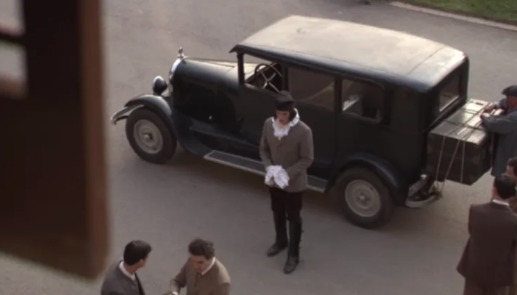
(Salvador Dalí)
The spectators see an absurd creature stand before them. Lorca feels a fresh wind of change entering his life.
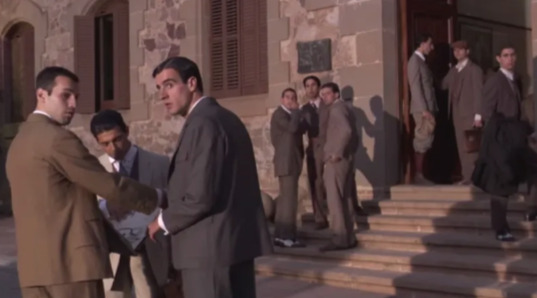
(Arrival at Art College in Madrid, Spain)
Dali is new and has not yet found out who he is as an artist. Whereas, Lorca is well known at the college and has made strides in his work. Having already been published and gained wider fame even beyond the college. Dali, having already been privy to Lorca’s work, looks up to Lorca and admires this writing.
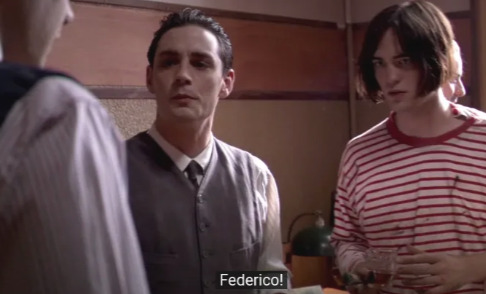
(Luis Buñuel and Salvador Dalí)
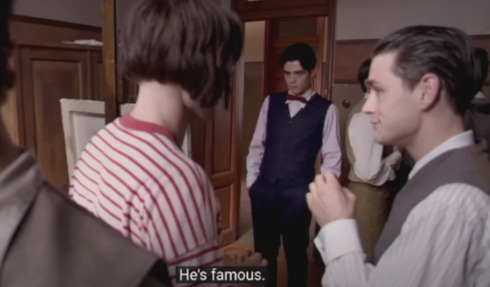
(Federico García Lorca)
Salvador uses Federico as his muse to inspire better paintings. He sees Lorca as the pinnacle of artistic inspiration. Although in truth, Lorca may have lost his duende and seems to have hit a plateau in his creative work. That is where the fresh and intriguing Dali has come in to help. Federico is fascinated by Dali and inflamed, quite literally turned on by his presence. It seems as though Salvador is also lacking a reason to paint as he can’t put his brush to a canvas for the first thirty-eight minutes of the film. When he does have a brush in his hand he looks stressed and frustrated. Much of the time Salvador is shown to be sneaking voyeuristic glances at Federico. This is the spark that the two needed in order to produce work that is inspired and passionate. At first, the dynamic between the two is like a game of cat and mouse. This push and pull could signify the tension it takes to create, before finally giving in and creating a piece of art.

Salvador was like most any other college student, lost, unsure of himself and begging for attention. The only way to capture the attention of the famous Federico Garcia Lorca was to quietly draw him into his web. He was strategic in his methods. Making himself appear to be in the right place at the right time, not to come off as trying too hard. He wanted Lorca to view him as intellectual and artistic, just as he views Lorca. His methods were adolescent. He placed a canvas that he had already finished painting on the easel. He assumed the pose of an artist, leaving his door wide open as to be seen by anyone who happened to be passing by, and ‘accidentally’ dropping his paint brushes as Luis Bunuel was walking by. However, Luis was on to his game and commented on his “strategically placed copy of Freud.”

(Luis Buñuel)
Dali is like a spider in how he captures his prey. At first, he was unassuming, as a spider’s web is unassuming. It is only when the prey is caught in the web does it realize how insidious the web becomes when initially it seems inviting and delicately sprung. That is, until the spider encases its prey with the same means that drew it in, and devours it with pleasure.
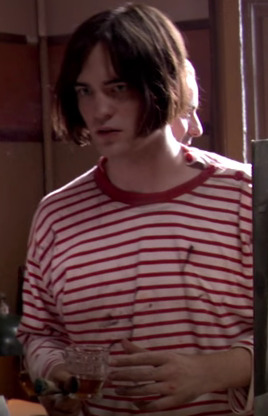
(An unassuming Salvador Dalí)
Attention*****Tumblr has limited my use of images. If you want to continue reading with any kind of viewing pleasure, click this link to head to the official blog post on my website. Sorry for the inconvenience.
Or continue reading without visual aid....
Dali joins a group of equally interesting and talented gentlemen and women. Dali is treated like a collected piece of art himself, as he is described as yet another acquisition of Luis Bunuel. The only ones brave enough to consider themselves genius are Dali and Lorca. The group appears to be a sort of rat pack. All sharing the same artistic airs of snobbery and frivolities. The woman called Magdalena claimed to have read eighty books over the holidays, when she had only read ten. This is just one example of the kind of performative intellectualism that goes on among these college students. This is normal behavior for this age group, as well as a common tendency of most artistically inclined people. They appear to believe that if they act as a great artist they may eventually turn into one.
Salvador, Federico, Luis, Magdalena and others
Since I am no history buff, I may not have a grasp on the details of the political nature in Spain in the nineteen-twenties. However, I can feel the spirit of revolution and necessary change that the anarchists propose. This is why I love Luis Bunuel’s commentary throughout the film. He is a no nonsense, honest type. Despite his unfortunate homophobic attitude, his commentary is bang on.
Luis Buñuel and Salvador Dalí
Bunuel is clearly into politics, and he holds what at that time, seems to be extreme beliefs. He wants the corruption purged from his country, by the most swift of means.
Luis Buñuel and Federico García Lorca
Lorca also shares this strong sense of liberation. Bunuel, being a part the Ultraism underground movement, takes Lorca and Dali to a low profile puppet show. The show highlights their political beliefs in a very humorous manner, but the message is clear. The pope is living in gross wealth by stealing from the people through taxation. While the people are living like peasants do, starving. They simply want freedom in their country. I can’t see why these democratic beliefs wouldn't have a wider appeal among the general populace. They have to go on about their political perspectives while hidden away in a hole in the wall.
We get another unforgettable scene in the film. At twenty-one minutes into the film, the tension is palpable. Lorca seems to have consciously discovered his admiration for Dali. In the scene, he is a little too obviously staring at Dali, yearning for him even. Then within a few micro expressions, he momentarily attempts to hide it, and finally he seems ashamed. Dali is unaware of Lorca’s staring, then he catches on, and is left equally embarrassed.
Little Ashes is perversely delightful. It inspires you to throw caution to the wind and do the things that most are afraid to do. Whether that be artistically, socially, politically, or sexually.
The funniest scene is the aftermath of this, with Federico’s realization of his desire for Salvador.
Federico García Lorca
Although both men are assumed to be straight, they experiment with their sexuality as they do their with their creative endeavors. This nineteen-twenties society doesn’t exactly welcome maricóns with open arms. Feddy is repenting for his “impure thoughts” of Salvador. He prays to be freed of this black widow spider. He continues to avoid him like the plague. There is a scene where Federico sees Salvador walking up the stairwell, and he reacts as though he has witnessed the devil incarnate himself.
This scene is not just about portraying Federico running from his homosexuality, this scene portrays the villainous energy of Salvador Dali and says a lot about Salvador as a character. Salvador stands for everything that is taboo and different. Dali is, by nature, a rare creature. He is artistic and strangely enchanting. Salvador Dali is the villain. His very existence threatens the established order. He is a disruption to society, the art world and to the people around him. He is capable of corrupting the status quo in the most interesting and unexpected of ways. Salvador Dali is a rare gem that Bunuel and Lorca were lucky enough to collect. Dali himself is like a fine painting worth billions. Ultimately, though, unlike a piece of art, he has the freedom to walk away anytime he likes. Dali cannot simply be owned like a painting.
Lorca despite his revolutionary aspirations, comes across as still rather old fashioned in some kind of way. Lorca is well mannered and morally righteous. He is the type to pray, respect his teachers and be diplomatic. Dali is alienated from any kind of normal demeanor and disregardful of the traditional niceties of society. He doesn’t care about keeping the peace and will be downright disrespectful and rowdy at times. Initially, it was this very chaotic behavior and strange persona that drew Lorca to him. In the end, the two grew apart and became too different to coexist with each other. Lorca grew tired of Dali’s games and found him to be displeasing. Perhaps it was Dali’s new admiration for fascism that put a bad taste in his mouth. After seeing so many of Dali’s childish antics, I personally can’t take anything he did seriously. For Lorca this stood against everything he was fighting for, and was unforgivable. Dali was a man of varied and extreme tastes.
Dali is certainly queer. Although it is a matter of semantics, I don’t think Dali was truly gay or at least not looking for a real relationship with Federico. Dali is so artistically inclined that he would be willing to try anything once and will quickly move on to the next thing that captures his attention. Federico just happened to be one of Dali’s many fixations. This is shown when Dali suddenly leaves Federico in Spain and goes to Paris with Bunuel to contribute to his play and advance his artistic predilections. In defense of Dali, I don’t believe that he was truly cold hearted. He merely had a higher vision and purpose to his life. Dali lives for art. Dali creates art but he also lives by the philosophy of art. Art cannot be understood logically but it has to be felt. Dali likes to feel energized and free. He is like a bird, he may leave Lorca today to fly to Paris, but by tomorrow he will be back to share his spoils. As a piece of art may be interpreted, you must interpret Dali’s actions.
Salvador Dalí
On the surface, Salvador Dali is a villain. Indeed he is the villain. But in the same thread, he is also the absurdist hero. Despite every dastardly action of Dali we root for him anyway. For the sake of the human spirit to be free! Dali is a rich well of multitudes of colors, like a rainbow. Perhaps Dali’s sexuality was as fluid as a rainbow and not so easily defined by human words. Each day he chooses a different color that will surprise and shock. Dali is disgustingly weak and fragile and in others he is brave and inventive. His transformation from the start of college to the beginning of his fame is like witnessing a train wreck come back from destruction.
Salvador Dalí
Interestingly enough, it does not appear that Federico was gay either. As he is always shown to be intertwined with Magdalena. Unless, you consider his relationship with Magdalena a performance. There is definitely a lot homophobic rhetoric and symbolism going on throughout the film, so it is likely that both Lorca and Dali felt internalized homophobia. Especially with the pressure from the larger conservative and violent society. Even their close friend, Luis Bunuel is shown as highly homophobic and threatens violence on the maricons.
Human relationships can be ambiguous so who can truly say. Queerness and artistic persuasions are similar, in that they creatively break the norms of society. It’s a good parallel to use to understand the revolutionary emotions of the film. Political freedom, artistic expression, and sexual liberty can all be frightening and exhilarating. I don’t think the focus of the film is only about sexuality. Salvador Dali is an artist that you cannot fully capture, there is something about him that you just can’t put your finger on. That is why Federico cannot understand Dali. He is not supposed to. The film is really great at doing just that. Dali is equally mystical and insane. I use insane pretty loosely here. I should really be using the word surreal when describing Dali.
Another way you can view their relationship, is that they admire each other’s creations so much that they wanted to make their art come alive in a more “raw” expression. As Bunuel said, both Dali and Lorca are “self-titled geniuses.” Love for oneself to an extent can become narcissism. Each became fascinated with the other due to seeing the reflection of their own genius in the other. Were they truly falling in love with one another or just falling in love with their own reflection? Ultimately, falling in love with the reflection of their own artistic sentiments. Much of the ambiguous nature of their relationship can be left to interpretation and is wonderfully captured in the film.
I do think Dali is absolutely savage in all of his expressions. With the way he behaves, it's any wonder how he can practically live in the real world outside of his artistic daydreams. Understanding Lorca’s success is easy because he has every positive affiliation under the sun. You feel that he has slowly and surely built a name for himself in the standard fashion. Dali is so disruptive that the surrealists literally “expelled him from the movement.” Creativity is by nature, a chaotic and destructive thing. That is why Dali detests the art college professors from critiquing him. Giving a commendable villainous speech on how he disapproves of the professors wasting his talent and showcasing how useless they are.
Salvador: “Gentlemen, I have returned from Paris with the conclusion that the entire amount of real, artistic knowledge contained within this panel of professors is not equal to one half of this. This, my fingernail. Not one half, gentlemen. And I’ve been insulting myself, by letting your shoddy practices, your pathetic outdated theories, and questionable character shit on my genius. I hope with all my heart that you’ll realize I am right and give up this foolishness and go back to the pigsties and the haystacks where you might be of some real use.”
Salvador Dalí roasting the art professors
Dali does not need the approval of anyone. He is willing to burn any bridge that stands in the way of his creativity. That is pretty savage. It is this quality that Magdalena admires in Salvador and the very reason she invites him to her aunt’s “legendarily dull dinner parties.” When someone says party, they instantly think of Dali. An actual quote from Salvador Dali comes to mind, “I don’t do drugs, I am a drug.” She even says that it is vital for her aunt to know people such as Salvador. He is a good representation of the revolutionary ideology that her conservative aunt is sheltered from. Merely being in Dali’s presence is enlightening. This isn’t to say that Salvador doesn’t get extremely drunk at the party. As you may have realized by now that Dali is truly a walking contradiction. Not only are there conservative people attending the party but literary censors from Madrid are present as well. This uptight and stuffy dinner party is the perfect scene to make Salvador Dali shine in all of his counter-cultural glory. At the very least, you will be entertained by his antics. Worst case scenario, you are chased out of the building by civil guards. Either way, it will be a night to remember.
Salvador Dalí at Magdalena's aunt's dinner party
Little Ashes: Defining quotes:
Luis Bunuel: “All the institutions that prop up this corrupt regime must be dismantled!”
Paco: “I just think it sounds a bit extreme.”
Luis Bunuel: “But it has to be extreme, Paco. It has to be complete revolution. All the churches, all the palaces.”
-
Salvador Dali: “You know, when I was small there was this ruined tower near our house in Cadaques. I would sit in this tower and I’d draw, and draw and draw. I never came down. Just imagine this little shrimp of a child, half-starved, covered in piss. And I wouldn’t come down in the winter, in the summer. In the freezing cold, I’d fill this iron tub with water and I’d sit in it for days. It’s like even then I realized that if I’m going to be anything more than average, if anyone is going to remember me, then I need to go further in everything. In art, in life. And everything that they think is real, morality, immorality, good, bad, I, we have to smash that to pieces. And we have to go beyond that. We have to be brave, Frederico.”
Federico Garcia Lorca: “No limit.”
Salvador Dali is excessive in his pleasures as well as his snobbery. He is self indulgent and selfish. To be fair, he needs to be selfish for the sake of his work. If Dali were not selfish, he would lose his artistic voice catering to the whims of others. It's this dastardly quality that makes Dali a villain, a villain you have to respect. Even though you hate him, you must admit that it is his unwillingness to compromise that makes him get what he wants. Dali is a fully concentrated, unfiltered can of artistic expression.
Dali can be considered a reckless trouble maker or a mischievous gremlin. Dali creates some sort of mayhem everywhere he goes. In one scene, Dali convinces Lorca to steal a couple of bicycles with him. Lorca gives in and follows Dali, throwing caution to the wind. This starts the beginning of a new chapter in their relationship. A dirty secret that no doubt draws Lorca only that much further into Dali’s web. Dali rides ahead at full speed, while Lorca can barely keep up. This is symbolic of their relationship, Dali moving forward and never looking back, while Lorca can only try to keep up with the new thing Dali is on to.
When I say Dali is a spider, I mean he has caught Lorca in his web of desire with no intention of a fulfilling relationship. I believe Lorca loved Dali more than he loved him back. You can always sense that Dali is somewhere else, that is just who he is. But you can sense the unevenness in their relationship by analyzing the scenes where they invite each other to their childhood homes. Salvador doesn’t invite Federico to his home, he says that he is coming, as if it is already a given. Federico overlooks his lack of consideration, and treats it as a forgivable child-like exuberance. Later in the film, when Federico politely asks Salvador to come to see his family, his home, and everything that he is, Salvador disregards his offer and tells him that he already sees who he is. That speaks volumes to me. It’s like Dali doesn’t care to know who Federico really is, outside of what he believes him to be, the famous and daring Federico Garcia Lorca. When Dali first arrived at college, his mind was preoccupied with art. His relationship with Lorca is purely business. Lorca serves as a muse and Dali is close to devouring him, physically and metaphysically. I think that is what is so selfish about Dali; he will use Lorca's heart if it will help improve him artistically. Dali is eccentric and almost inhuman. His artwork made him immortal in a sense. I think that is what he was going for. Dali assumed that they would live on in his paintings forever. Lorca believed that eventually they would be nothing but dust, or little ashes. There is a sensibility in Lorca. Dali always seemed to have eyes that were larger than his stomach, in terms of what he wanted to achieve. His visions were always fantastical and simply nonsensical. In art, this is an empowering notion. In real life, it is simply unrealistic.
So Federico goes to visit his family for the holiday break, alone. He writes this letter to Salvador:
“Salvador, I think of you and I’ve never thought more intensely in my life. Since our time together, everything I am has been split apart. I write in a way that I’ve never thought possible. My pen scratches the surface of things, the masks. And then it goes beyond them, right down to the bones. Down to the dark, cold jelly in the marrow.”
And he writes back.
“Federico, from the day you left, I’ve been in the studio day and night. I started to work on designs for your play. I’m doing them gypsy-style. Andalusian, like you. The unconscious mind, Federico, rises like a beast within me. I let it speak and it produces such wonders.”
Then once more from Federico,
“It’s true. I touch sea bottom in myself and my poems write themselves. I am, just as you said, raw, bloody, alive. And I, too, want to be alive.
Dali, once again, is a little thief and steals the key to Lorca’s room. He is working on the set designs for Lorca’s play. This is where the two share a kiss before they are interrupted by Luis. Before that though, Dali mentions a line from Lorca’s letter, “everything that you are being split apart.” This line in his letter also caught my attention. Federico said something similar to this when he invited Dali to his childhood home. He said “I want to show you everything that I am.” When Dali refused and he was left alone to visit, that was when he wrote “everything that I am being split apart.” Was this splitting apart triggered by the absence of Dali? It seems like a romantic notion, but it may be due to Dali’s all-encompassing influence on Federico. Dali seems to have changed Federico’s view of himself to fit the ideals of Dali. Living in Dali's world has corrupted Federico. Dali has completely disrupted his morality and his religious beliefs. For better or worse, is not the point. The point is, Dali has a hold on Lorca. Like a spider, Dali has fully wrapped Lorca in his web. Just in time for feasting on his face.
Luis asks Federico how the progress for his screenplay edit is going only to find out Federico has no idea what he is talking about. He is referring to the screenplay he asked him to write about. Federico’s excuse being that he hadn’t had much time. It’s because his world now revolves around the all-important Salvador Dali. Dali asks Feddy to “play the putrescent game,” to Luis’s confusion. Luis looks as though he is being left out of some inside joke. Dali explains that putrescent is his new word and that it means outdated, outmoded. As if to say that the friendship between Federico and Luis is outdated. The word that Dali owns seems to signify that Luis is living in Dali’s world now. The atmosphere changes as though Salvador has put a wall between Luis and that he has Federico all to himself. Luis tries to play along but it is clear that there is something special between the two of them that Luis is no longer involved in. It’s the Dali and Lorca show and Luis has become the third wheel. Federico attempts to hide the tense atmosphere by inviting the whole gang out. Dali asks Lorca what he should wear. Luis is sensing their homo relationship. Obviously, it appears like the homophobic Luis is becoming suspicious of the two. Beyond that, It once again highlights the level of narcissism in Dali and the control he has over Federico. Could what Lorca sees as a mutual relationship, really just be Dali indulging in his artistic frivolities? Dali could never have this much self-involvement in any friendship, so he uses the intimate relationship he has with Lorca to play his strange games and to self-indulge in his own egoism.
Salvador: “Federico is working on something now that will blow everything apart.”
Luis: “What’s it about? His family? Butterflies? God?”
Salvador: “Me.”
Salvador Dalí talking to Luis Buñuel
Somehow, Dali, this strange man has consumed Federico Garcia Lorca for everything that he is and has spit him back out. Lorca has turned his back on everything and everyone for Dali. Where once Dali was the fanboy of Lorca, now Lorca is a fan of Dali. Dali has truly used an Uno Reverse Card here. Does Dali share the same amount of admiration and loyalty? Not really. Dali leaves Federico behind for the opportunity of finding success in Paris. After listening to Luis talk about how dull Lorca’s work is and how he the people in Paris "wouldn’t give a fuck about his work." Dali doesn’t defend Lorca, he only talks about himself. The level of snobbery is unmatched. It only takes a little convincing on Luis’s part to convince Dali not only is Federico done for as an artist, but that life in Spain is over with.
After all of the accommodation Federico had done for Salvador, it is understandable why he would be upset that he left him. Salvador chose to work with Luis, the rageful homophobe of all people. Dali goes to Paris to pursue his art, to meet Picasso and the surrealists. Lorca quickly comes to understand that he is losing Salvador, that he doesn’t hold the same grip that Salvador has on him. Salvador was always flighty and unpredictable, but he was never this way towards him. It's as if their relationship was just another bright and sparkly object that momentarily caught Dali’s eye. If Federico was split apart before, now he is absolutely ripped apart and burned to little ashes.
In the first half of the film, we witness the transformation of Dali from a meek thing into a loud and daring man. With the inspiration of Federico Garcia Lorca, Dali was able to transform from a novice artist into a genius artist from the tales of some fantastical myth. By the second half of the film, Dali has once again reinvented himself, this time without the presence of Federico. When Federico sees Salvador for the first time since he’s arrived back in Spain, it is like he is meeting an entirely new person. Dali is ever changing, like the moon has many phases. Sadly, Federico was caught in a phase that couldn’t come true. Dali has left a mark on Lorca’s heart, though it doesn’t seem that Dali has been affected at all. Can he really brush off all that has happened and begin a new life just like that?
When Dali returns to share his exploits, including the naked photo of a woman called Gala. Lorca is not so happy with Dali’s cavalier attitude. He doesn’t want to be considered as just another one of Dali’s fascinations or thrilling conquests. He wants to matter, but not in the way Dali thinks he matters, as the famous Federico Garcia Lorca. Wasn’t their relationship more personal than that? Were the sentiments they shared merely just artistic thrills? Did any of that actually touch Dali’s heart? It definitely touched Lorca, “down to the very cold jelly in the marrow.”
Federico had grown tired of Dali’s games. He wants to know who Dali really is, not just who he pretends to be. Dali plans to start what he calls his “real life.” This makes Federico feel like nothing more than an old pair of tattered shoes. Salvador now made it sound like the time he spent with Federico was nothing but a dull and tortuous thing of the past he had to endure. Not only is Dali physically different, but the change in Dali’s character is totally unrecognizable to Federico. He feels alienated from the man he once felt so close to. After the time spent in Paris, it is clear that Luis has become Dali’s new compadre, as he begins to recite the same homophobic rhetoric back to Federico in the most hypocritical fashion.
Dali: “Why can’t you just be happy for me?”
Dali: “You’re a selfish fucking maricon.”
Salvador Dalí with Federico García Lorca
Again, it is a shame the homophobic rhetoric will paint Salvador Dali's actions as purely evil. Instead, if we just look at the situation in terms of pursuing artistic endeavors, we will see that Dali's actions are quite necessary to the success of his artistic ambitions.
Speaking of Luis and Dali spending their time together in Paris. The film they were creating strongly references to Lorca, it is called “An Andalusian Dog.” It looks like it was Dali and Bunuel's intention to mock Lorca.
Federico García Lorca with Magdalena
That is some truly despicable backstabbing. What did Lorca ever do to you Dali? It seems like the only way Dali could come to terms with his own internalized homophobia was to blame Federico for his feelings. Spending time with Luis was not a positive influence on the highly influenced Dali. Being that his identity is so flexible. Federico may have brought out the best in Dali, both artistically and emotionally. Whereas Luis brought out the worst in him.
Dali stopped all communication and affiliation with Lorca. Not responding to the letters that Federico had written to him. Federico was completely pushed out of Salvador Dali’s life.
Federico: “It’s as if nothing ever happened. Sometimes I think we never even met.”
By the time Federico catches up with Dali for the final time, Dali has been fully transformed into a caricature of the man he once knew. He is sporting a ridiculous mustache, no matter how fashionable it may be. His speech is full of metaphors and he speaks in an odd accentuated manner. By some impossibility, his clothes and surroundings are somehow even more pretentious than they were before. Dali comments that Federico looks the same in contrast to Dali whose identity changes like a revolving door.
Salvador recites Wait Whitman: “All this time. The dark unfathomed retrospect. The teaming gulf. The sleepers and shadows.”
Salvador introduces his wife Gala to Federico and seems to be trying to create some sort of ménage à trois scenario.
Dali: “The only viable solution to surrealism is the world war. A cleansing. Cut through all this dead wood. Purge the weak elements. An era of enlightenment.”
Salvador Dalí with Federico García Lorca and Gala
Lorca: “Are you saying you actually support the fascist? You used to be an anarchist.”
Federico García Lorca with Salvador Dalí and Gala
Dali: “Oh Federico, you’ve become so liberal. What with your government schemes and your theatral little people.”
Lorca: “Listen, this country is on the brink of something terrible and here you are siding with the people who could destroy everything we stand for. I know you are not through but you must see there’s been no freedom of speech. Anyone who is different, who strays from the norm would just be wiped out.”
Dali: “Would that be a bad thing?”
Lorca: “You’re joking.”
Gala explains that Dali is not interested in politics. That doesn’t mean he should mock Federico and his beliefs. Salvador knows the severity of the situation but instead makes light of it and turns it into a joke.
Federico recites his poem of Dali and wants him to recite his ode, telling of his olive-colored voice. Once again highlighting Dali’s egocentrism. Lorca says Dali always has a plan for everything. Dali claims he can guess the actions of Lorca. This is because Dali is a spider and spins his plans like a spider would its web. Like a spider can sense the vibrations on the web when its prey moves, Dali always knows the next move of the people trapped in his web. Dali proposes that Federico pack his things and come with him to conquer America. Another attempt to pull Federico back into his web of control. After suggesting a ménage à trois situation, Federico is not into it and leaves pretty quickly after that. The sad thing is that Dali had deluded himself into thinking that Federico truly had nothing better to do than to wait around for the great King Dali.
Federico returns to his home town of Granada only to be targeted by the civil guard and abducted. Federico has made a name for himself after his political views became a threat to the established regime. The punishment for freedom of speech is death, apparently. After Federico Garcia Lorca is executed by the civil guard, Salvador Dali loses his mind. Salvador Dali's sanity was already questionable, but this time he’s really lost it for good. I’m sure Salvador was feeling latent regret.
Takeaway: Salvador used Federico as a muse and his personal fan. He had no real feelings. Salvador used him as training wheels before he outgrew him. Federico sees Salvador’s growth as a negative instead of a natural process and change of life. Let the bird fly and if it comes back to you it was meant to be. By the time Salvador came back, Federico had also grown and moved on. Both men pursued their creative work. Having had the beautiful experiences and inspiration from the other to move forward in their careers.
Bonus for the romantics:
If you care to view Dali the way I believe Lorca sees him, feel free to read the inner dialogue I wrote of Federico Garcia Lorca below. Warning: Federico is a total simp for Salvador.
Federico García Lorca staring at Salvador Dalí
Federico García Lorca STILL staring at Salvador Dalí
Someone who is interesting from head to toe. Strange hair style and an avant garde fashion sense. Everyone notices you when you enter the room. You take with you a universe of dreams. Your sturdy yet fragile ego. The nervous tremor in your hand is what makes you all the more fascinating. How can someone as strong as you be nervous in simple situations such as this? It’s humanizing, you who was untouchable might just be like me in a way. If I could be similar to you I would be flattered. The piece of hair tucked behind your ear. Although you look like a nervous mess and a bundle of nerves I sense that you hold a stronger power than you confess. The intensity emanating from the darkness in your light colored eyes. I see who you really are behind the mask.
Someone who is more interesting on the inside. Whose powers and abilities are seemingly endless. Wanting to look deeper into your soul but getting lost in an endless abyss. The odd remarks you make. Your delusional imagination of the past and future. You have a grandiose self image that carries you forward at an unstoppable rate. You are extraordinarily impressive when you do what you really want without approval from others. The way you disregard the standards set by our society. You yell, mock, vandalize and oppose the established order.
Although you look like a pathetic chicken standing on his only leg, you are absolutely dazzling. It’s almost entertaining to see what you’ll look like tomorrow. You are so dynamic I can't wait to see what happens next. Meeting you was like unfolding a story. You change your identity daily. You don’t care if you’re mad. You boldly lie about who you are. But I actually believe your lies. The lies you tell are still a part of who you are, inside. You can imagine things that others can’t, you imagine a different world, turned upside down on its ass. I’ve found myself wanting to trust in your lies over reality.
All I need is to follow you, no matter where it leads me. The world is just the world but the world changes when you’re in it. Even when you do things that I can not find myself to begin to forgive you for. You don’t sacrifice your dreams for anyone, not even me. I’m okay with that. I know that I am just another chapter in the grand story of you. I just want to stay in the plot for as long as I'm useful. You seem to always know where you’re going. You have a mission in life. Your life has a purpose unlike most. You are my messiah. Your brain thinks twice as fast as mine. Your imagination is endless. I’m on a ride and I don't want to get off. It’s exhilarating and I pity those whose lives are completely stationary going round and round on the same orbit.
This has been a creative review of "Little Ashes" 2008 Film, Starring: Robert Pattinson, Director: Paul Morrison, Screenplay: Paul Morrison, Philippa Goslett
youtube
I highly encourage you watch this film if you haven't already.
Article written by Nina Robinson, author of novel "Villainism", via villainism.com
#robert pattinson#salvador dali#little ashes#robert pattinson fanfic#little ashes fanfic#robert pattinson ff#queer stories#villainism#Youtube
17 notes
·
View notes
Text
It is not necessary for the public to know whether I am joking or whether I am serious, just as it is not necessary for me to know it myself.
1 note
·
View note
Text
The Traumatism is felt
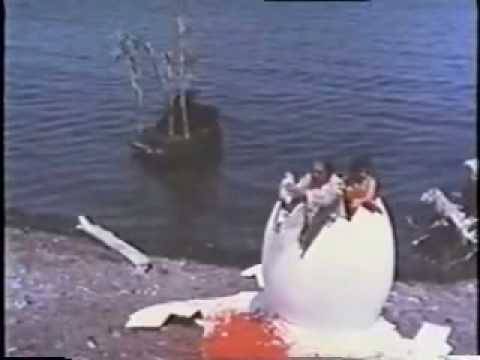
1 note
·
View note
Text
Ok, just hear me out...
When Edward ran away from Forks to escape the urge to indulge in Bella's blood, he went to Denali.
Denali is an anagram for denial.
Edward was in denial for his love for Bella when he first met her. His initial attraction to her may not only be for the thirst of her blood but for her.
Edward was in Denali in denial.
2 notes
·
View notes
Link
This should not have taken 25 hours to write.
4 notes
·
View notes
Photo

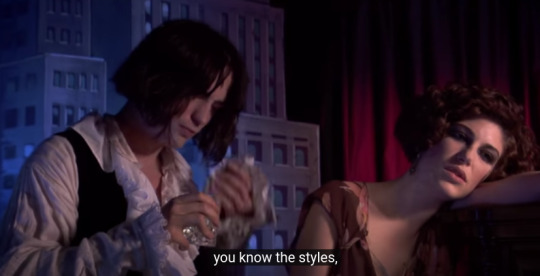
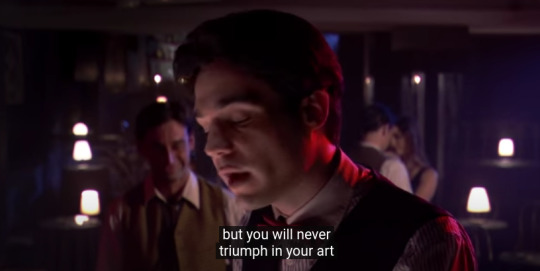
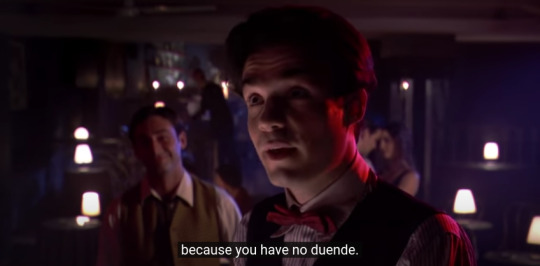

Read: Little Ashes: The Surreal Insanity of Dalí
2 notes
·
View notes
Text
I started writing at 4 o'clock, why am I only taking a break at 7:25 am?
And to think it's due to this ridiculous twat...

1 note
·
View note
Text
What a perfect specimen to write about. An unassuming, yet arrogantly twisted villain you can root for.
Expect a long article for this little freak.
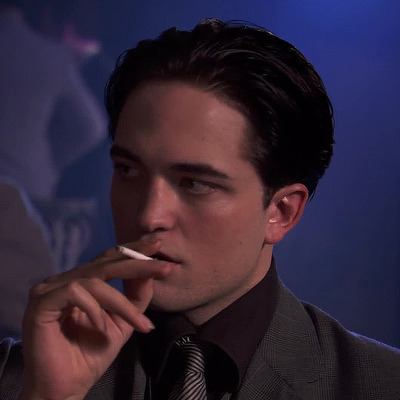
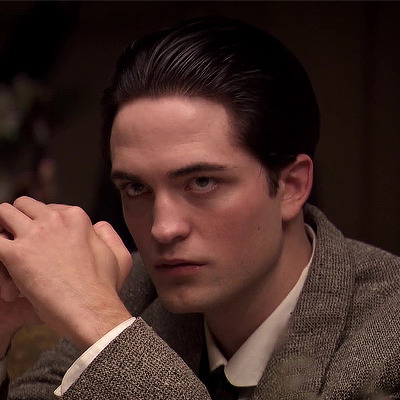
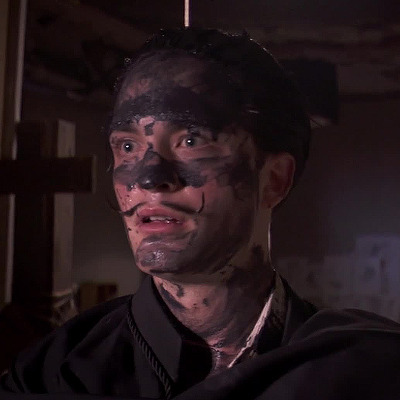
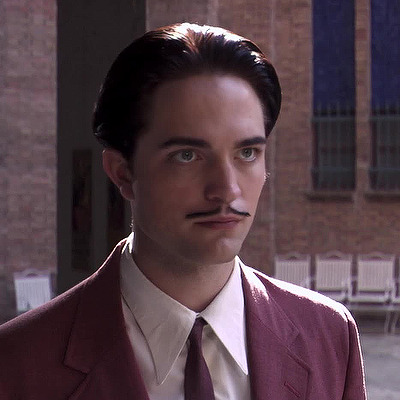
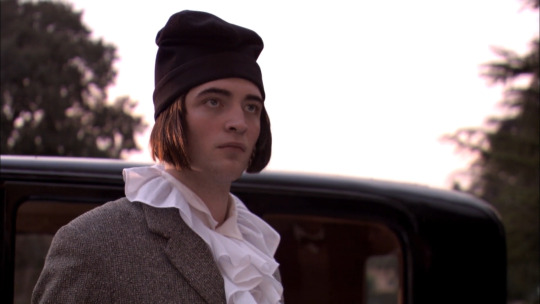
Salvador Dali
5 notes
·
View notes
Text
Who is Nina Robinson?
Nina Robinson (born January 27, 1999) is an American author from Canton, Ohio. The facts contained in this article cannot be proven but sources say they are likely to be the closest to the truth one can possibly get.

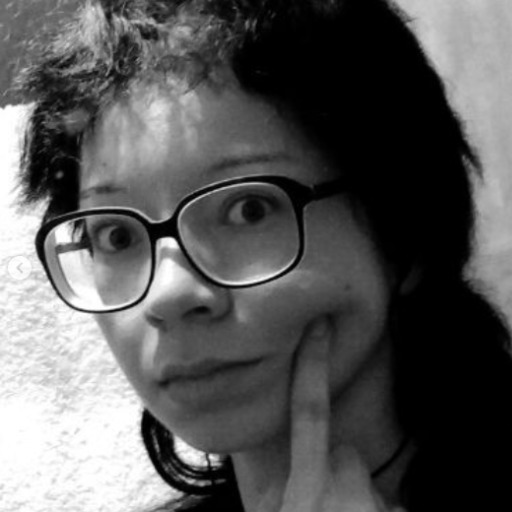
Her debut novel Villainism was independently published on October 22, 2022. In honor of her first novel, Nina was keen to do more than just the writing. She did all the tedious editing and other important jobs that a publishing house would normally help a writer with. She took advantage of the self-publishing platform Amazon Kindle Direct Publishing (KDP).
Nina wanted to be able to express what a villain was in more than just words, so she created a special piece of art that you can now see showcased on the cover of the novel. The painting represents the essence of Villainism. Gaze into the villain's eyes and feel the villain's existential horror.

Author Nina Robinson is fascinated by odd subjects that could be seen as taboo. She is compelled to investigate what is hidden from ordinary daily life and her writing is fueled by uncovering the mysteries and occult phenomena in the world.
While Nina is not playing the author, she could be wearing another one of her various hats, including but not limited to artist, actor, podcast host, blogger, captain of the high seas, and occult researcher.
If one, or many, wishes to contact Nina Robinson they may do so through villainism.com
#nina robinson#villainism a villains transformation#villainism#villainism book#writers on tumblr#writer#author#books
3 notes
·
View notes
Link

This cursed photograph is actually on my fridge

#connie nikas#good time#robert pattinson#movie quotes#quotes#edward cullen#nina robinson#villainism#robert pattinson meme#meme
7 notes
·
View notes
Link

#good time 2017#good time movie#connie nikas#safdie brothers#Nina Robinson#villainism.com#villainism#Villainism A Villain's Transformation#movie review#writers on tumblr#writer#robert pattinson#robert pattinson meme
7 notes
·
View notes
Text
Odin’s Hypocrisy Translated
youtube
Odin to Loki: “Everywhere you go there is war, murder and death.”
My commentary: Hypocrite much!
Odin: “All this, because Loki desires a throne.”
My commentary: He says this while sitting on the throne of privilege himself while Loki is in the chains of slavery.
Loki: “It is my birthright.”
My commentary: Like I said, Odin dangled the glory of rulership over his head while pitting Loki and Thor against each other for it.
Odin: “Your birthrighT, was to DIE! …as a child. Cast out on a frozen rock.”
Translation: I was going to kill you when you were a mere baby and I regard your home realm as nothing more than a “frozen rock.” Again, hinting at my racism and lack of remorse for the genocide of your people.
Odin to Loki: “If i had not taken you in, you would not be here now to hate me.”
Translation: If I had just murdered you when you were a baby then you would not be here now exposing my lies to everyone and making me look like an unsuitable king and abusive kidnapping monster.
Odin to Loki: “Frigga is the only reason you’re still alive and you will never see her again.”
Translation: Unlike me, Frigga is remorseful for lying to you and I must keep her happy or else she may go rogue and expose me for who I really am to the Asgardian people and I don’t want to lose my throne of power and control.
Odin to Loki: “You will spend the rest of your days in the dungeon.”
Translation: I can’t kill you so this is the second best option, hide my victim in the dungeon or else he cries “me too” and my rulership is threatened.
Loki to Odin: “And what of Thor, you will make that witless oaf king as I rot in chains?”
My commentary: Yes of course! Thor is his only son and Odin is too narcissistic to let the Asgardian people live free without rulership, the people must be under the thumb of the Odinson bloodline.
Odin to Loki: “Thor must strive to undo the damage you have done, and will bring order to the nine realms, and then yes, he will be king.”
Read the full article Loki’s Injustice: A Case Against Odin at Villainism.com
Written by Nina Robinson author of Villainism: A Villain’s Transformation
#loki#thor loki#thor odin#mcu#villainism#villainism.com#villainism: a villain's transformation#nina robinson#nina robinson blog#loki and odin
22 notes
·
View notes
Text
< RIDDLE >
<?> What happens when a president dies?
<A> He turns green.
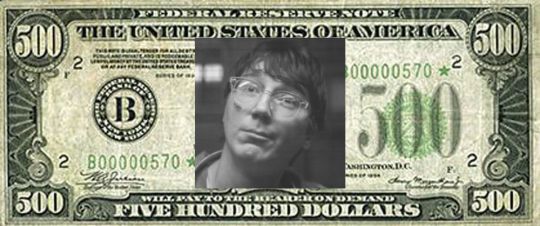
(dead president=money)
8 notes
·
View notes
Text
Robert Pattinson’s Villainous Characters
My article on The Batman wouldn’t have been made if not for Robert Pattinson’s dark portrayal of Bruce Wayne, as if he was still playing the angsty and peculiar Edward Cullen.
I am going to write many many more articles on the psychology of the characters Mr. Pattinson has played. His characters are all villainous and absurd, its such a delight to explore the inner workings of their minds.
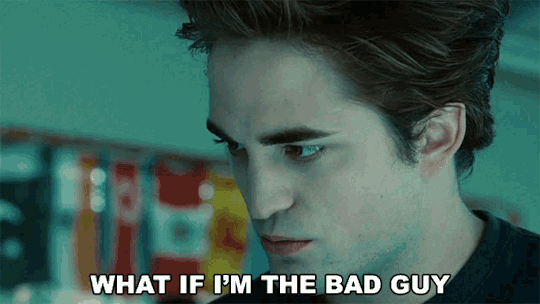
If you can think of any roles he’s played that are like villains, comment below. I’ll pretend that i don’t already know every single one. No, it’s just that i might write the articles based on who comments first, so that is why.
1 note
·
View note

